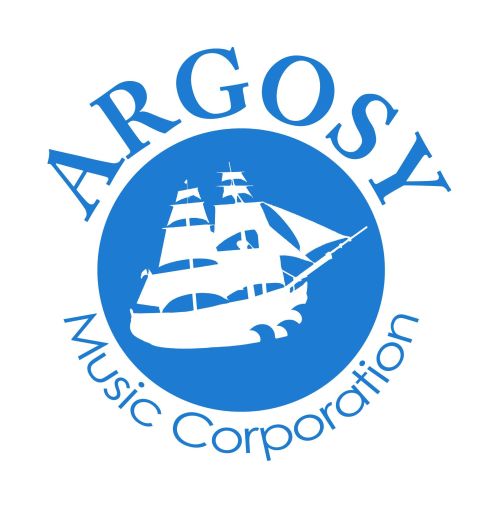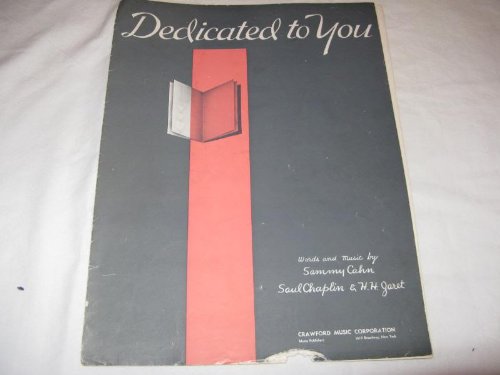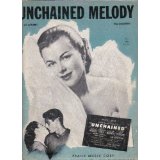 Home
Home
After high school, he went to West Virginia University, primarily to play football. When he showed up for football practice, the coach suggested he should try wrestling instead. After looking at the players in the locker room, Mr. Zaritsky decided to take the coach's advice; most football players were taller than 5'5" even then.
Mr. Zaritsky was determined to be a poet, but his mother convinced him to become a lawyer. So he earned his law degree from Brooklyn Law School. He then limited his practice to closings for clients of his father, who was a realtor. The practice provided enough money and left time for writing.
He decided that lyricists were at least a bit more likely than poets to earn a living, so he became a lyricist.
In 1934, Mr. Zaritsky changed his last name to Zaret.
In the summer of 1939, he and a friend went to visit another friend, who was a counsellor at a sleep-away camp. While there, Mr. Zaret met another counsellor named Shirley Goidel. He said he would marry her. She thought he was crazy and avoided him for several months. In the fall, he convinced his younger sister to be his "date" (complete with pseudonym) for a party that Shirley would attend. Hy and Shirley married 28 June 1940, and remained married until his death.
On 12 June 1945, Thomas Michael Zaret was born; Mr. Zaret wrote a parody of "One Meat Ball" as the birth announcement. On 28 July 1948, Robert Edward Zaret was born; Mr. Zaret wrote a parody of "Listen to the Green Grass Growing" as the birth announcement. Thomas died 14 June 1984 of a brain tumor; he is survived by his wife and son. Robert is pleased and proud to be reviving his dad's songs.
Hy Zaret died 2 July 2007, one month shy of his 100th birthday. Many of his papers are now at The Archives of the Michael Feinstein American Songbook Initiative.
 In 1935, he wrote
"Dedicated to You"
with
Saul Chaplin and
Sammy Cahn.
It became his first hit and is still a perennial jazz favorite, with recordings by
Billy Eckstine,
Carmen McRae and Shirley Horn,
Ella Fitzgerald,
Nat King Cole,
Sammy Davis Jr.,
Tommy Dorsey,
John Coltrane and Johnny Hartman,
and others.
In 1935, he wrote
"Dedicated to You"
with
Saul Chaplin and
Sammy Cahn.
It became his first hit and is still a perennial jazz favorite, with recordings by
Billy Eckstine,
Carmen McRae and Shirley Horn,
Ella Fitzgerald,
Nat King Cole,
Sammy Davis Jr.,
Tommy Dorsey,
John Coltrane and Johnny Hartman,
and others.
In 1941, three of Mr. Zaret's songs became hits. Ted Weems and his orchestra had a hit recording of "It All Comes Back to Me Now" (writen with Joan Whitney and Alex Kramer); Frank Sinatra also recorded it. Jimmy Dorsey had a hit recording of "My Sister and I" (written with Joan Whitney and Alex Kramer). And Vaughn Monroe had a hit recording of "There I Go" (written with Irving Weiser).
 During World War II, Mr. Zaret was in the U.S. Army Special Services, along with
Frank Loesser,
Alex North,
Peter Lind Hayes,
Jerry Livingston,
Arnold Auerbach,
Jose Limon,
and others. He wrote musical parodies for
"Yank" magazine,
and many of these were recorded on an album called "Strictly GI;" the picture shows Mr. Zaret and New York's Mayor La Guardia, with each holding a copy of the album.
He wrote "Soldiers of God" (song of the Army chaplains); the official song for the WAC;
"Song of the Army Nurse Corps;" "Saga of a Sad Sack" (with Frank Loesser); and other official songs. He also wrote English lyrics for "The Marseillase" (French National Anthem),
"Song of the French Partisans"
(recorded by
Leonard Cohen and
Joan Baez
), "Garibaldi War Hymn,"
Katyusha"
(with musical adaptation by Lou Singer,
recorded
by Nat King Cole),
and the Soviet Union's new anthem.
This picture shows a party for Mr. Zaret (center) at the Special Services office.
During World War II, Mr. Zaret was in the U.S. Army Special Services, along with
Frank Loesser,
Alex North,
Peter Lind Hayes,
Jerry Livingston,
Arnold Auerbach,
Jose Limon,
and others. He wrote musical parodies for
"Yank" magazine,
and many of these were recorded on an album called "Strictly GI;" the picture shows Mr. Zaret and New York's Mayor La Guardia, with each holding a copy of the album.
He wrote "Soldiers of God" (song of the Army chaplains); the official song for the WAC;
"Song of the Army Nurse Corps;" "Saga of a Sad Sack" (with Frank Loesser); and other official songs. He also wrote English lyrics for "The Marseillase" (French National Anthem),
"Song of the French Partisans"
(recorded by
Leonard Cohen and
Joan Baez
), "Garibaldi War Hymn,"
Katyusha"
(with musical adaptation by Lou Singer,
recorded
by Nat King Cole),
and the Soviet Union's new anthem.
This picture shows a party for Mr. Zaret (center) at the Special Services office.
 After the war, Mr. Zaret continued his collaboration with
Joan Whitney and
Alex Kramer. They wrote 33 songs together, including "It All Comes Back to Me Now;" "No Other Arms, No Other Lips" (recorded by
The Chordettes and
Slim Whitman);
"You'll Never Get Away" (recorded by
Louis Prima with Gia Maione, Sam Butera & The Witnesses and
Teresa Brewer);
"So Long For A While" (theme song for "Lucky Strike Hit Parade"); and the two songs ("It All Comes Back to Me Now" and "There I Go") mentioned above.
After the war, Mr. Zaret continued his collaboration with
Joan Whitney and
Alex Kramer. They wrote 33 songs together, including "It All Comes Back to Me Now;" "No Other Arms, No Other Lips" (recorded by
The Chordettes and
Slim Whitman);
"You'll Never Get Away" (recorded by
Louis Prima with Gia Maione, Sam Butera & The Witnesses and
Teresa Brewer);
"So Long For A While" (theme song for "Lucky Strike Hit Parade"); and the two songs ("It All Comes Back to Me Now" and "There I Go") mentioned above.
 Mr. Zaret's most prolific collaboration was with
Lou Singer.
Their first hit was "One Meatball."
In 1944, the Andrews Sisters had a hit
recording,
Josh White's
recording
sold a million copies, Josh White featured it at Cafe Society Uptown while
Jimmy Savo
featured it at Cafe Society Downtown, and Josh White and his son (
Josh White Jr.)
recorded it for Armed Services Radio.
Dave Van Ronk has also
recorded it.
In 1947, they wrote
Patrick Henry and the Frigate's Keel: A Musical Legend by Howard Fast,
based on the
novel
by
Howard Fast.
Zaret and Singer also wrote "Young and Warm and Wonderful"
(recorded by
Gene Pitney,
Tony Bennett,
James Darren, and
Eddie Adams Jr.);
"Atom and Evil" (recorded by
The Golden Gate Quartet);
"Listen to the Green Grass Growing;" "I Spoke to Jefferson at Guadalcanal;" "Israel's Freedom Ballad;" "My Lily and My Rose;" "The Lass with the Delicate Air"
(recorded by
Josh White,
and a variation on an old English song by
Michael Arne); and hundreds of
Little Songs, including
Ballads for the Age of Science and
It Could be a Wonderful World.
Mr. Zaret's most prolific collaboration was with
Lou Singer.
Their first hit was "One Meatball."
In 1944, the Andrews Sisters had a hit
recording,
Josh White's
recording
sold a million copies, Josh White featured it at Cafe Society Uptown while
Jimmy Savo
featured it at Cafe Society Downtown, and Josh White and his son (
Josh White Jr.)
recorded it for Armed Services Radio.
Dave Van Ronk has also
recorded it.
In 1947, they wrote
Patrick Henry and the Frigate's Keel: A Musical Legend by Howard Fast,
based on the
novel
by
Howard Fast.
Zaret and Singer also wrote "Young and Warm and Wonderful"
(recorded by
Gene Pitney,
Tony Bennett,
James Darren, and
Eddie Adams Jr.);
"Atom and Evil" (recorded by
The Golden Gate Quartet);
"Listen to the Green Grass Growing;" "I Spoke to Jefferson at Guadalcanal;" "Israel's Freedom Ballad;" "My Lily and My Rose;" "The Lass with the Delicate Air"
(recorded by
Josh White,
and a variation on an old English song by
Michael Arne); and hundreds of
Little Songs, including
Ballads for the Age of Science and
It Could be a Wonderful World.
From 1948 to 1951, Mr. Zaret was a writer for the CBS radio show Sing it Again.
 In 1954,
Mr. Zaret received a phone call from
Alex North.
Mr. North had just completed the score for a movie, and needed a lyric for the theme song. Mr. Zaret initially declined because he was too busy overseeing the painting of his house. Mr. North said the movie was about a model low-security prison, and Mr. Zaret agreed. The movie was called
"Unchained"
and the new song was called "Unchained Melody." The movie came out in 1954, and is forgettable. But several recordings of the song were hits that year and the song received an Oscar nomination (the winner was "Three Coins in a Fountain" from the movie
"Three Coins in the Fountain").
In 1990, the movie
Ghost used a
1965 recording by
The Righteous Brothers. In 2011,
Ghost: The Musical retold the same story as the movie.
The song has been recorded by thousands of artists, and many recordings have been hits. In 2007, it received
ASCAP's Towering Song award.
In 1954,
Mr. Zaret received a phone call from
Alex North.
Mr. North had just completed the score for a movie, and needed a lyric for the theme song. Mr. Zaret initially declined because he was too busy overseeing the painting of his house. Mr. North said the movie was about a model low-security prison, and Mr. Zaret agreed. The movie was called
"Unchained"
and the new song was called "Unchained Melody." The movie came out in 1954, and is forgettable. But several recordings of the song were hits that year and the song received an Oscar nomination (the winner was "Three Coins in a Fountain" from the movie
"Three Coins in the Fountain").
In 1990, the movie
Ghost used a
1965 recording by
The Righteous Brothers. In 2011,
Ghost: The Musical retold the same story as the movie.
The song has been recorded by thousands of artists, and many recordings have been hits. In 2007, it received
ASCAP's Towering Song award.